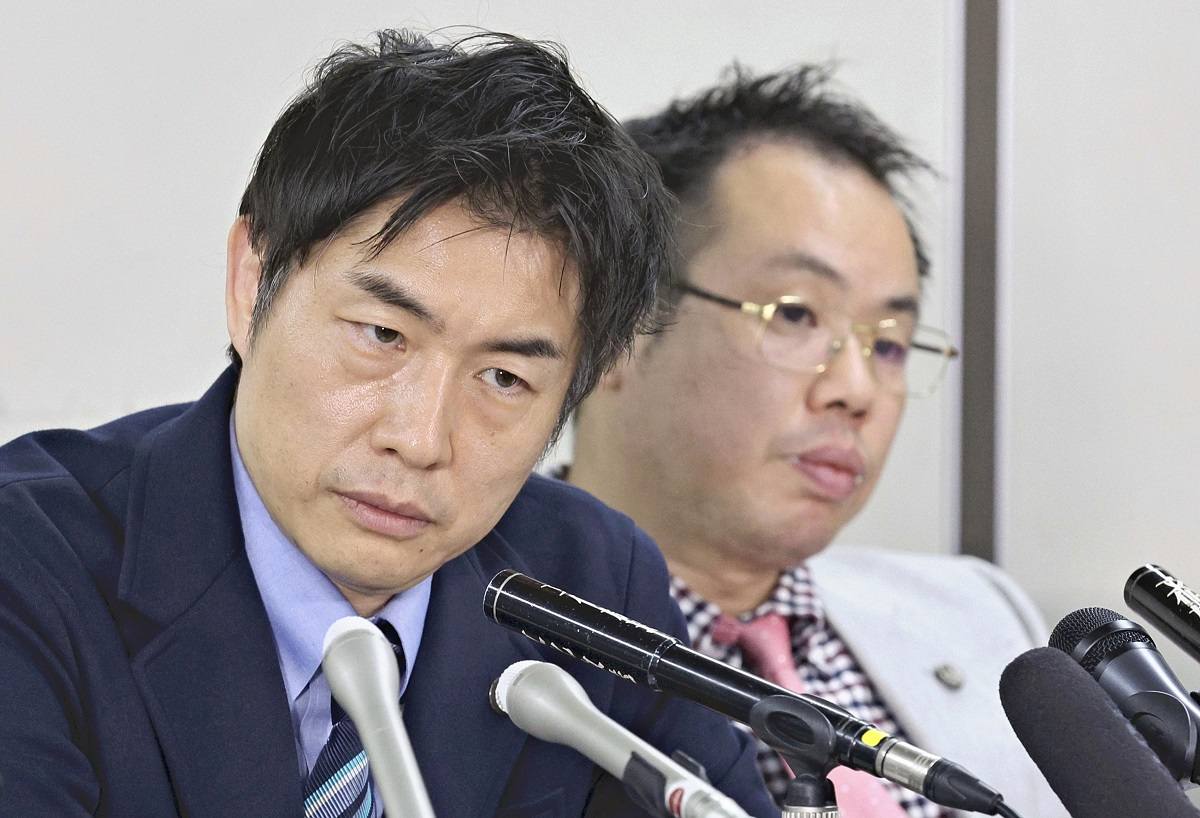Japan Supreme Court’s Transgender Ruling Sparks Joy, Worry; Questions Remain About One Requirement of Relevant Law

Attorneys Kazuyuki Minami, left, and Masafumi Yoshida hold a press conference in Tokyo following the Supreme Court’s decision on Wednesday.
17:00 JST, October 26, 2023
Wednesday’s top court decision was seen by some as a step forward in eliminating the suffering and pain of many people who wish to officially change their gender.
The Grand Bench of the Supreme Court deemed it unacceptable to force people to undergo major surgery to change their gender on their official family register, ruling for the first time that a legal provision requiring them to eliminate their reproductive capabilities is unconstitutional and void. However, the court deferred a decision on another requirement of the law, resulting in the petitioner still being unable to officially change gender.
“It was very regrettable that a decision on the actual gender change was deferred. But, I would be happy if the result of this case leads to a positive outcome,” the petitioner said in a written statement that her attorney, Kazuyuki Minami, 47, read out at a press conference held on Wednesday afternoon in response to the decision that day by the 15-member Grand Bench.
Born with a male body, the petitioner filed the case seeking to change her gender to female. She has undergone hormone therapy for many years but has not undergone surgery to eliminate her reproductive capacity. She therefore did not meet a requirement in the special law on gender dysphoria to “have no gonads or for those organs to have permanently lost their function” — a provision known as the requirement to remove reproductive capability.
At a closed-door hearing in the Grand Bench on Sept. 26, the petitioner told the justices in a choked voice about the circumstances of her lack of surgery.
Wednesday’s decision eliminated the need for her to undergo surgery related to her reproductive capacity, but it is still not clear whether she could change her gender on her family register until the completion of hearings about another provision of the law — one known as the requirement to change appearance, in which she must have a body that has parts resembling the genital organs of the sex she wishes to change to.
On this matter, three justices indicated their view on Wednesday that the appearance requirement was also unconstitutional, and that she should be allowed to change her gender. When Minami informed her of this over the phone, the petitioner broke down in tears, saying she was relieved that there were justices who understood her feelings.
Minami described the ruling of unconstitutionality as “of great significance,” but also was frustrated by the situation in which the petitioner still has to suffer.
In 2019, the Second Petty Bench of the Supreme Court stated that the requirement to eliminate reproductive capability was constitutional. The petitioner in that case, Takakiito Usui, from Okayama Prefecture, held an online press conference Wednesday saying, “I thought it was only a matter of time before the court ruled it unconstitutional, and I accepted the decision with joy.”
Born in a female body and living as a man, Usui, 50, said he was considering filing a petition anew for a gender change in order to marry his female partner in the future.
‘Confusion in society’
Some who supported the requirement for the elimination of reproductive capability expressed criticism and concern.
“I can’t help but say the top court ran out of control,” a lawyer for interest group Save Women’s Space Jp said. “The Grand Bench failed to mention the fact that overseas gender change [policies] based on gender identity have harmed the safety and security of women.”
Uno Ishigami, 53, who represents the group No! Self ID For Women’s Rights and Women’s Safety, said, “It could cause great confusion in society if anyone is allowed to freely choose their gender without surgery.”
Yoshie Nagoya from Kanagawa Prefecture, who underwent surgery to become a woman last year, feared that the decision would lead to transgender bashing in general. Nagoya, 53, said she was concerned that a clash of opinions over gender changes may become more severe.
In response to the top court decision, the Justice Ministry, which has jurisdiction over the special law, said, “We will take the decision solemnly, fully examine its contents and take appropriate action.”
Top Articles in Society
-

Man Infected with Measles Reportedly Dined at Restaurant in Tokyo Station
-

Man Infected with Measles May Have Come in Contact with Many People in Tokyo, Went to Store, Restaurant Around When Symptoms Emerged
-

Producer Behind Girls Group XG Arrested for Cocaine Possession
-

Woman with Measles Visited Hospital in Tokyo Multiple Times Before Being Diagnosed with Disease
-

Australian Woman Dies After Mishap on Ski Lift in Nagano Prefecture
JN ACCESS RANKING
-

Japan PM Takaichi’s Cabinet Resigns en Masse
-

Japan Institute to Use Domestic Commercial Optical Lattice Clock to Set Japan Standard Time
-

Israeli Ambassador to Japan Speaks about Japan’s Role in the Reconstruction of Gaza
-

Man Infected with Measles Reportedly Dined at Restaurant in Tokyo Station
-

Videos Plagiarized, Reposted with False Subtitles Claiming ‘Ryukyu Belongs to China’; Anti-China False Information Also Posted in Japan





















